
This is where you find all our press releases and news articles.
Fish food extruder machine is specialized equipment designed to produce fish feed in various forms, including pellets, flakes, and granules. These machines are essential in the aquaculture industry, where the demand for high-quality fish feed is continuously growing.
The extruder machine works by forcing the feed mixture through a die under high pressure and temperature, resulting in the desired shape and texture. The process also ensures that the feed is cooked, sterilized, and free from pathogens, making it safe for fish consumption.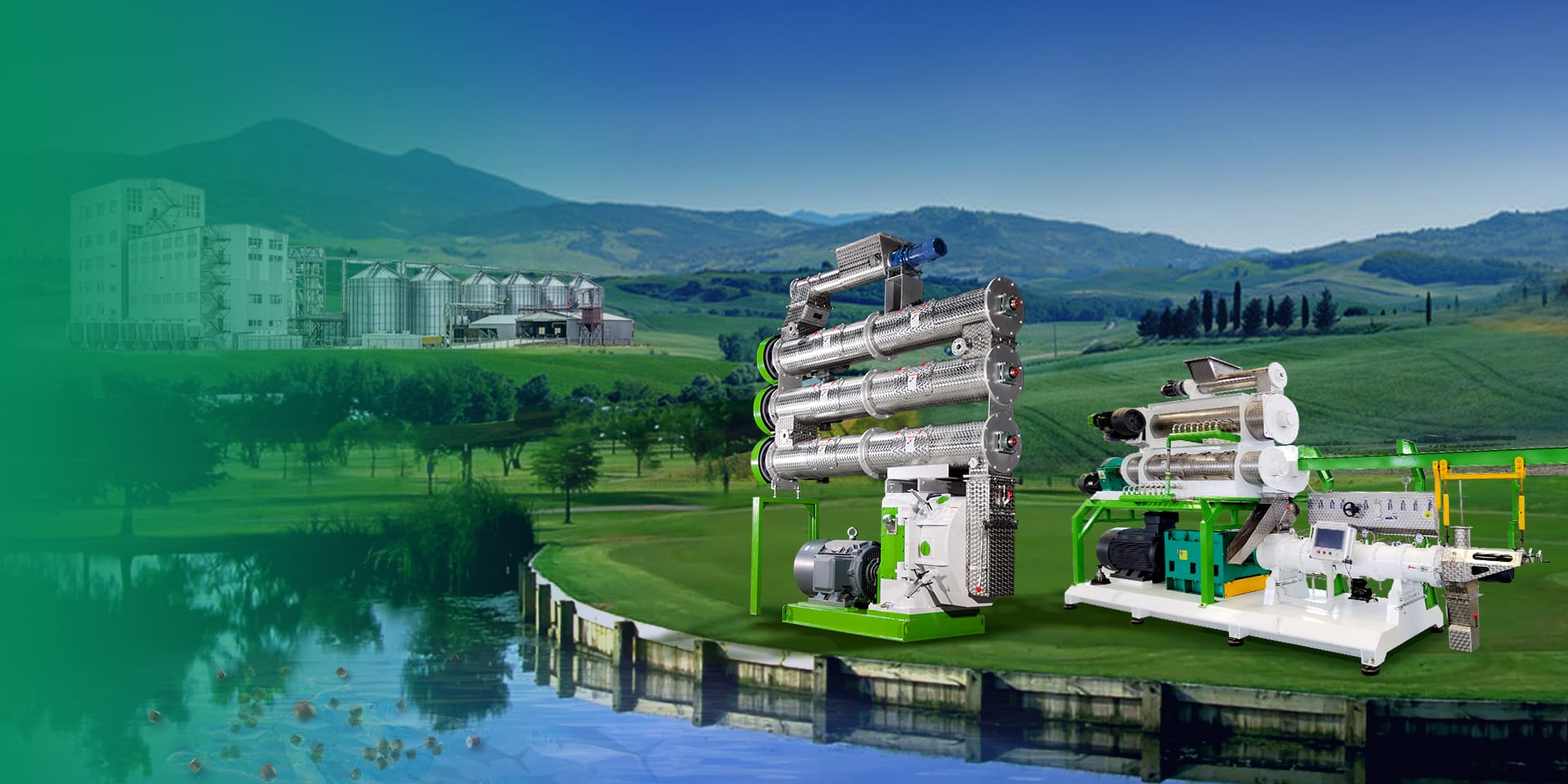
The use of fish food extruder machines offers several advantages:
The choice of extruder machine depends on whether you need to produce floating or sinking feed:
The primary difference between processing floating and sinking fish feed lies in the extrusion parameters and the formulation of the feed mixture.
Floating fish feed is designed to remain on the water surface, making it easier for fish to consume. To produce floating feed, the extrusion process involves higher temperatures and lower pressures. The feed mixture typically contains a higher proportion of starch, which expands during extrusion, creating air pockets that make the pellets buoyant.
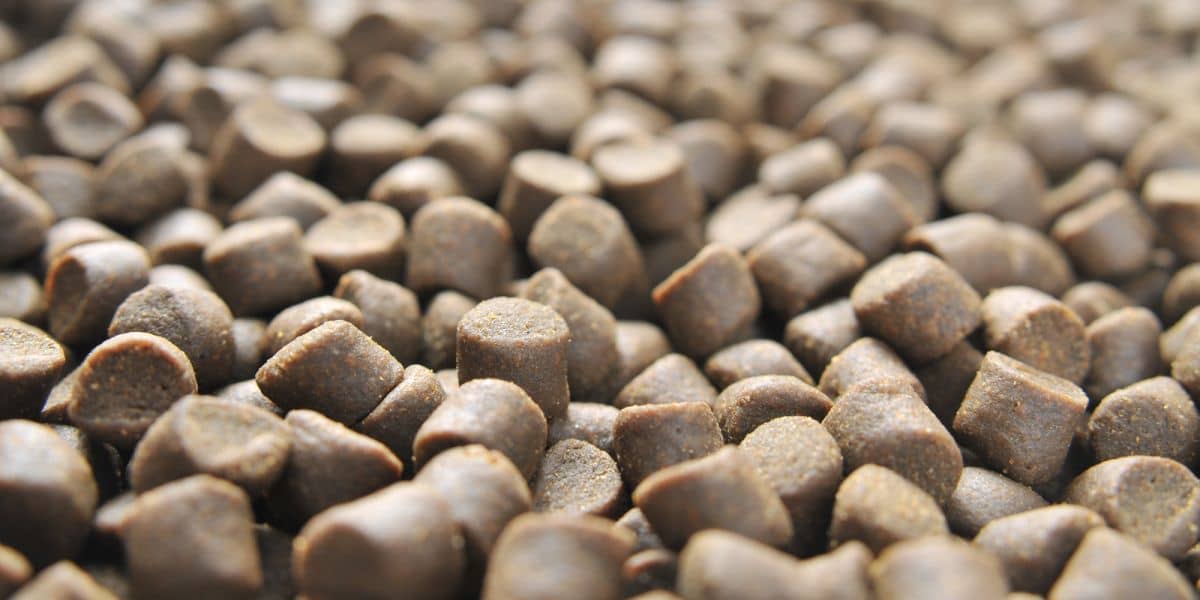
Sinking fish feed is designed to sink quickly in water, making it suitable for bottom-feeding fish species. The extrusion process for sinking feed involves lower temperatures and higher pressures. The feed mixture contains less starch and more protein, resulting in denser pellets that do not expand as much during extrusion.
Choosing the right fish food extruder machine for processing floating fish feed and sinking fish feed is a critical decision that directly impacts the quality, efficiency, and profitability of your aquaculture operation. Here’s a comprehensive guide to help you make an informed choice:
Before selecting a fish food extruder machine, assess your specific requirements:
There are three main types of extruder machines, each suited for different applications:
Twin-screw fish food extruders are highly efficient and versatile machines that use two intermeshing screws to process the feed mixture. They are capable of handling a wide range of raw materials and can produce both floating and sinking feeds. The twin-screw design allows for better mixing, cooking, and shaping of the feed, resulting in high-quality pellets.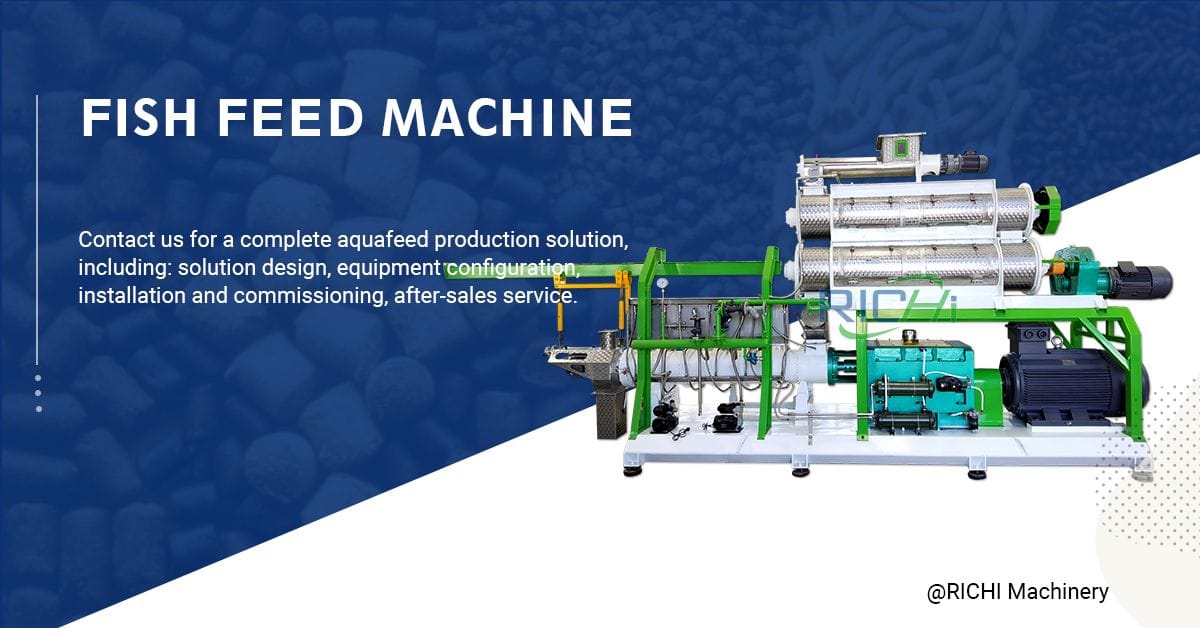
Best For: Both floating and sinking fish feed.
Advantages:
| Model | SPHS75x2 | SPHS120*2 | SPHS150*2 | SPHS185*2 | |
| Main motor power (kw) | 55 | 90 | 110 | 200 | 355 |
| Screw diameter (mm) | 75 | 120 | 120 | 150 | 185 |
| Feeder power(kw) | 1.5 | 1.5 | 1.5 | 1.5 | 2.2 |
| Conditioner power(kw) | 7.5 | 11 | 11 | 11 | 11 |
| Conditioner Specifications | DC400-244 | DC500-244 | DC500-244 | DC600-300 | DC600-300 |
| Differential Conditioner Power(kw) | 11 | 11 | 11 | 15 | 15 |
| Specifications of Differential Conditioner | DC400*300-244 | DC500*400-300 | DC500*400-300 | DC600*500-300 | DC600*500-300 |
| Output (T/H) | 0.5-1.0 | 1.5-2.0 | 3.0-4.0 | 5.0-6.0 | 10-12 |
Single-screw dry type fish feed extruders are simpler in design and operation compared to twin-screw extruders. They use a single screw to push the feed mixture through the die. These machines are typically used for producing floating feeds and are suitable for small to medium-scale operations. The dry extrusion process does not require additional moisture, making it energy-efficient.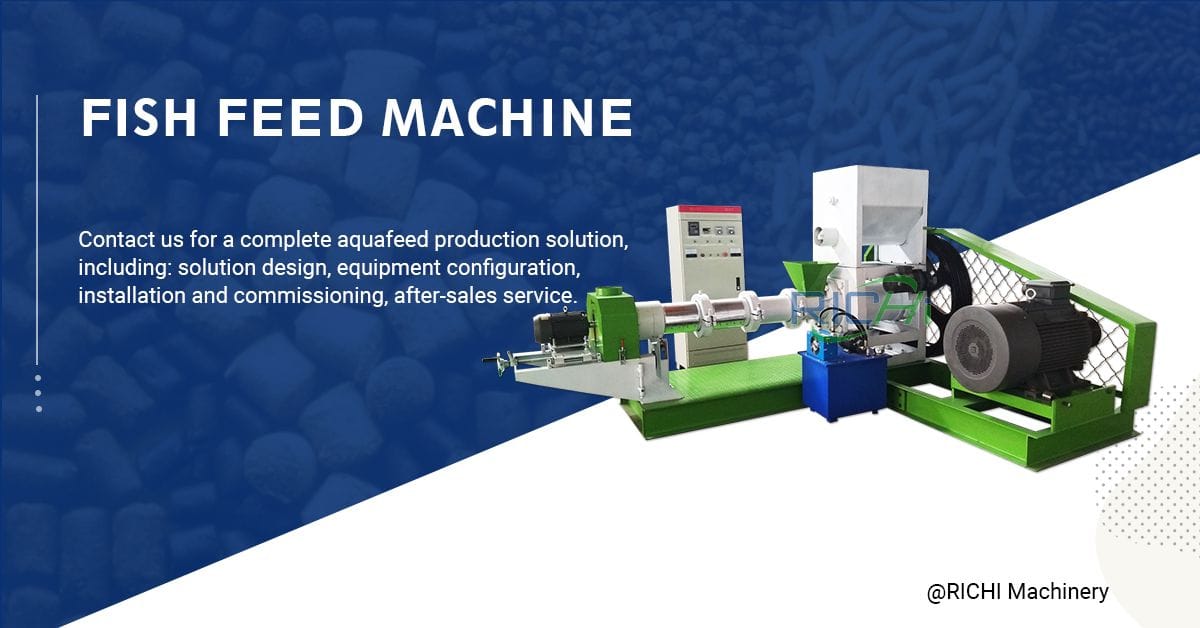
Best For: Floating fish feed.
Advantages:
| Model | DGP-90B | DGP-120B | DGP-160B |
| Main motor power (kw) | 37 | 55 | 90 |
| Feeding power (kw) | 0.75 | 202 | 3 |
| Cutting power (kw) | 0.55 | 1.1 | 1.5 |
| Screw diameter (mm) | 90 | 120 | 160 |
| Machine size (mm) | 2100*1450*1350 | 2400*1950*1600 | 3100*2650*1800 |
| Output (T/H) | 0.2-0.4 | 0.5-0.6 | 0.8-1.0 |
Single-screw wet type fish feed extruders are similar to dry extruders but require the addition of steam or water during the extrusion process. This added moisture helps in the gelatinization of starch, which is essential for producing sinking feeds. Wet extruders are commonly used for producing high-density feeds that sink quickly in water.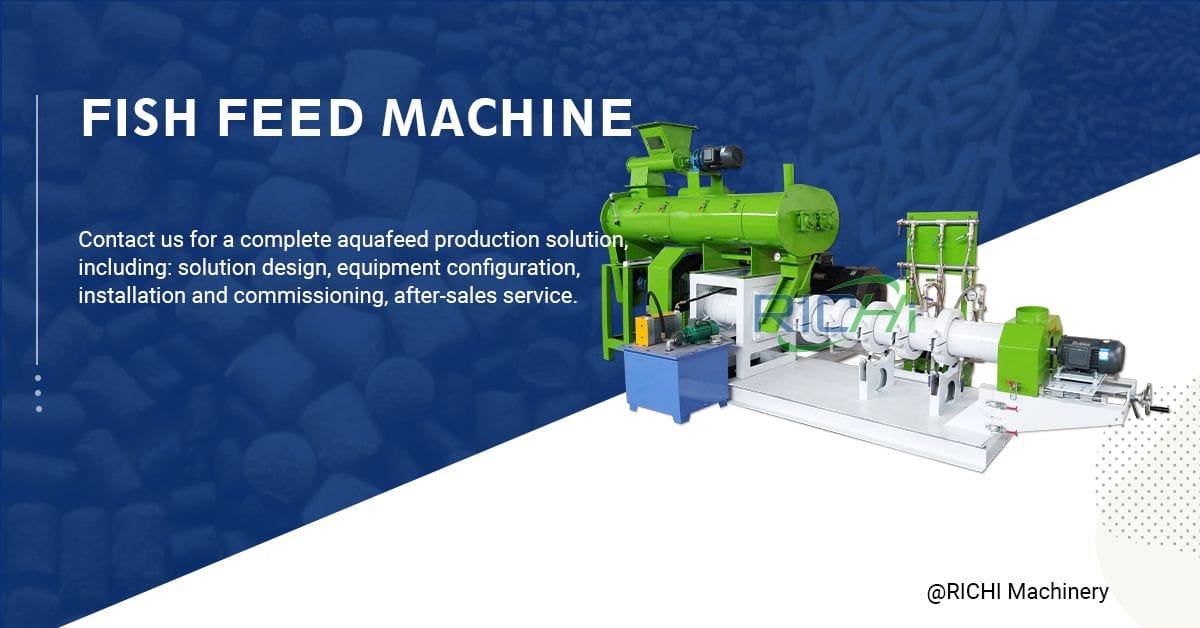
Best For: Sinking fish feed.
Advantages:
| Model | DSP-90B | DSP-135B |
| Main motor power (kw) | 37 | 75 |
| Feeding power (kw) | 7.5 | 7.5 |
| Conditioning power (kw) | 1.1 | 2.2 |
| Cutting power (kw) | 1.1 | 1.5 |
| Screw diameter (mm) | 90 | 135 |
| Machine size (mm) | 2600*1600*1900 | 3750*1980*1950 |
| Output (T/H) | 0.5-0.6 | 0.8-1.0 |
When choosing a fish food extruder machine, look for the following features:
Choose a reputable supplier with a proven track record in manufacturing fish food extruder machines.
Ensure the supplier offers after-sales support, including installation, training, and maintenance services.
Check for warranties and availability of spare parts.
If possible, request a demonstration or trial run to evaluate the machine's performance.
Test the machine with your specific raw materials to ensure it meets your production requirements.
Choose machines that comply with environmental regulations and safety standards.
Look for energy-efficient models to reduce operational costs and environmental impact.
Consider your long-term goals. If you plan to expand production or diversify into different types of feed, invest in a versatile machine like a twin-screw extruder.
Ensure the machine can adapt to future advancements in feed formulations and production technologies.
By carefully evaluating your production needs, budget, and long-term goals, you can select the right fish food extruder machine to produce high-quality floating and sinking fish feed, ensuring the success and sustainability of your aquaculture operation.
The price of fish food extruder machines varies depending on the type, capacity, and features. Generally, twin-screw extruders are more expensive than single-screw extruders due to their higher efficiency and versatility. Prices can range from a few thousand dollars for small-scale fish food machines to over $200,000 for large-scale, high-capacity extruder machines.
Fish food extruder machine projects involve the setup and operation of feed production lines in aquaculture farms or feed mills. These projects require careful planning, including the selection of the appropriate extruder machine, raw material sourcing, and workforce training. Successful projects can significantly improve the efficiency and profitability of aquaculture operations.
The prospects for fish feed processing vary across different continents, depending on the level of aquaculture development and market demand.
Asia is the largest producer of aquaculture products, with countries like China, India, and Vietnam leading the way. The demand for fish feed is high, and the use of extruder machines is widespread. The market is expected to continue growing as aquaculture practices become more intensive and commercialized.
Africa has significant potential for aquaculture development, but the industry is still in its early stages. The use of extruder machines is limited, but there is growing interest in adopting modern feed production technologies to improve fish farming productivity.
The fish feed processing industry in CIS countries is experiencing increasing demand due to the expansion of aquaculture and the need for sustainable, high-quality feed to support fish farming. With abundant natural resources and a strategic geographic location, CIS countries have significant potential to become key players in the regional and global fish feed market.
Europe has a well-established aquaculture industry, with a focus on sustainable practices. The use of extruder machines is common, and there is a strong emphasis on producing high-quality, environmentally friendly fish feed.
North America has a mature aquaculture industry, with a focus on producing high-value species like salmon and trout. The use of extruder machines is widespread, and there is a growing trend towards producing specialized feeds for different fish species.
South America has a rapidly growing aquaculture industry, particularly in countries like Brazil and Chile. The use of extruder machines is increasing, and there is a strong demand for high-quality fish feed to support the growth of the industry.
Oceania, particularly Australia and New Zealand, has a small but growing aquaculture industry. The use of extruder machines is limited, but there is potential for growth as the industry expands and adopts modern feed production technologies.
Fish food extruder machines play a crucial role in the aquaculture industry by producing high-quality fish feed that meets the nutritional needs of different fish species. The ability to produce both floating and sinking feeds makes these machines versatile and essential for modern fish farming. As the aquaculture industry continues to grow globally, the demand for extruder machines is expected to increase, driving innovation and improvements in feed production technologies. If you are interested in our fish feed extruder, floating fish feed machine, sinking fish feed machine, feel free to contact RICHI MACHINERY to get equipment quotes, videos, pictures and other information!
Having the right mix of reliable, high-quality pellet machine and pelletizing systems and expert support is essential to your success. Watch how our end-to-end feed pellet plant solutions have helped our customers optimize their performance.
Our customized and future-proofed turnkey pellet plant solutions is designed with you at the core. From vision to reality and beyond, our team stays connected with yours. Giving you peace-of-mind with an expert at your side.

At RICHI, we go beyond project completion. With RICHI Servicee, we’re your dedicated partners in success. Count on us for expert guidance, minimal downtime, and optimized productivity. Choose RICHI for unmatched service and support.



Meet global product demands and quality standards with industry-leading pellet plant design, engineering, equipment, and construction services for pellet processors.


Your Partner Beyond Project Completion
2000+ cases
RICHI is the leading designer, manufacturer and builder of pellet plants in the world, completing over 2000 projects in 140 countries across 6 continents.
Read More
Increase plant productivity, profitability, and safety by integrating high quality equipment into your pellet production line. Over the years, RICHI has become China's top pellet equipment manufacturer. At the same time, RICHI has established valuable partnerships with the world's leading component and raw material manufacturers to bring you the best there is in technology, automation, and efficiency in pelleting plant machinery.

For nearly 30 years, RICHI has been providing best-in-class pellet plant equipment and services to clients across a variety of industries, sizes, and needs. We pride ourselves on the knowledge and skill that each team member possesses – from our technical sales team to our process design engineers. You can count on RICHI Machinery to take your operation to the next level of innovation, quality, and success.
Need help with your pellet manufacturing plant project? Contact us today.
ANIMAL FEED
BIOMASS
WOOD
ORGANIC FERTILIZER
AQUA FEED
CAT LITTER
MUNICIPAL WASTE RECYCLING
SPECIAL PELLET PRODUCTION
RICHI Machinery continues to deliver world class pellet mill equipment, pellet plant engineering and project solutions that add value to our customers in the animal feed, wood waste, agriculture waste, organic fertilizer, cat litter and special pellet products industries. Throughout the years, we RICHI Machinery have built strong brand, becoming industry-leading pellet machine manufacturer. We value integrity, promise quality, and prioritize your success.
Learn MoreWith our expert team, we precisely implement your process engineering requirements in pellet mill and pelletizing plant systems. No matter which industry you’re in – we understand your needs and deliver solutions that meet the highest standards.
At RICHI, quality comes first. Our pellet making machine and related pellet line equipment undergo rigorous quality controls to ensure they meet the highest standards. Rely on products that are durable, safe, and efficient.
With decades of experience in pellet machine and pellet production line production, we have earned a reputation as a trusted partner in various industries. Our expertise allows us to cover a wide range of applications.
Not only do we offer premium pelleting equipment, but we are also experts at designing, building, installing, and maintaining facilities from the ground up. Our expertise is within pellt plant process design, discovering the most efficient, productive, and profitable way to handle your materials in an end-to-end cycle.

Keeping in touch with us is an effective way to solve all your problems. If you have any needs or questions, please leave your contact information, then RICHI technical consultants will send design, quotation, videos to your mailbox. You can also contact us directly via WhatsApp: +86 13838389622
Copyright©2015-2024 by HENAN RICHI MACHINERY CO., LTD. All rights reserved.
 en
en